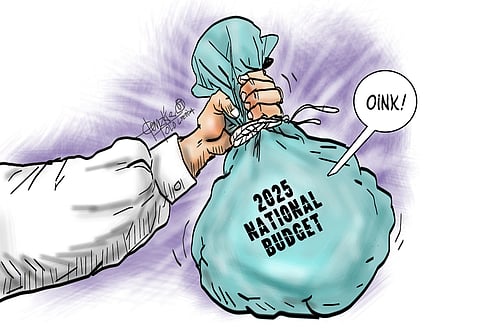
- NEWS
- the EDIT
- COMMENTARY
- BUSINESS
- LIFE
- SHOW
- ACTION
- GLOBAL GOALS
- SNAPS
- DYARYO TIRADA
- MORE

A conspiracy among legislators in the Senate and the House of Representatives who make up the bicameral conference committee to secure pork barrel funds resulted in the need to raise P450 billion more for so-called unprogrammed funds.
University of the Philippines School of Economics Professor Cielo Magno, a former finance undersecretary and among those who petitioned the Supreme Court to bar a directive of the Department of Finance (DoF) to retrieve excess funds from state firms, said that in the 2024 budget the unappropriated portion was increased by P450 billion.
This was the result of accommodating insertions or projects that had political purposes that found their way as priority items during the bicam deliberations on the 2024 General Appropriations Act.
The usual process is the executive branch, particularly the economic team, makes proposals to the budget and matches these with the sources of funds. That happens yearly in the budget process.
A portion of the budget is called unprogrammed projects that are only implemented if the government can tap additional revenues, either through new taxes or an improvement in the performance of collection agencies. Changes in the exchange rate and additional borrowings are also possible sources of additional funds.
In the original 2024 budget proposal, the unprogrammed projects were limited to around P250 billion but the bicam increased this to P700 billion.
Magno said that what happened was that some of the regular items in the budget were bumped off and placed in the unprogrammed appropriations.
Pet programs of senators and congressmen, such as flood control, multi-purpose halls and others where they can put their names to, took the place of the sidetracked programs, according to Magno.
Among these shelved items was the already delayed payment to healthcare workers.
Thus, priority was given to the usual pork barrel sources through the insertions that has been the practice after the Supreme Court ruled the Priority Development Assistance Fund or the legislative pork barrel unconstitutional in 2013.
With the insertions, the Department of Public Works and Highways’ original proposed budget of P821 billion was inflated to P996 billion in the final version of the 2024 General Appropriations Act.
Thus, to raise money for the items that suddenly were not a priority due to the substitutions made in the budget, the DoF came up with the directive to scour for excess funds that identified, among others, the P89.9 billion in PhilHealth that came from government subsidies.
The health insurance agency has two sources of funding, which are the premiums that workers remit and government subsidies.
The subsidies were meant to pay for the inclusion of the indigent and marginalized sectors in the public health system.
Under the Universal Health Care Law, PhilHealth is required to use its excess funds only to expand its services to members and to lower premium payments.
Magno argued that having excess funds did not mean that health services had been fulfilled but rather they resulted from the inefficiency of PhilHealth.
Instead of fixing PhilHealth’s shortcomings, the DoF directed the retrieval of P89.9 billion of its excess funds since these came from subsidies from the sin tax.
She stressed that the sin tax law specifically provides that collections from higher charges on cigarettes and liquor be specifically spent on improving healthcare.
The operational costs of PhilHealth remained low because of inefficiency as it failed to enroll Filipinos who were required to be part of the Universal Health program.
There is also no provision in the law that allows PhilHealth to return excess funds to the national government.
Magno said the petition filed with the SC seeks to stop Finance Secretary Ralph Recto and his porky cohorts from manipulating the budget.
The High Tribunal is expected to rule on the petition for an injunction before another P30 billion from PhilHealth is siphoned off by mid-September.
